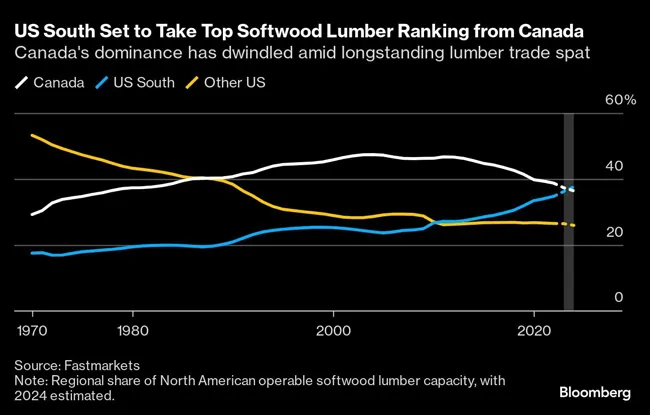Bloomberg News
US South Set to Surpass Canada in Lumber Production

[Stay on top of transportation news: Get TTNews in your inbox.]
The U.S. South is poised to overtake Canada’s historic dominance in North American lumber production as decades of trade restrictions take their toll.
The region will surpass Canada in softwood lumber capacity for the first time since at least 1970, according to commodity pricing agency Fastmarkets. The shift reflects how a key Canadian resource sector has declined due to U.S. duties and other challenges, including wildfires, land-use regulation and insect infestations.
The U.S. increased import duties on Canadian softwood lumber by nearly 81% in August, the latest development in a four-decade trade dispute. Analysts expect the levies — currently at 14.54% — could double again next year under the Commerce Department’s annual review.
The measures demonstrate how trade policies can reshape industries. Import restrictions are a prominent topic in the U.S. presidential race, with Republican candidate Donald Trump advocating widespread tariffs on foreign goods.

(Source: Fastmarkets via Bloomberg)
The U.S. has long accused Canada’s C$10 billion ($7.2 billion) industry of dumping low-priced wood and argued that government fees paid by Canadian loggers for timber harvesting amount to a subsidy. The dispute has particularly affected British Columbia, where forest products represented a quarter of exported commodity value in 2022.
“You would see widespread curtailments throughout not just BC, but across Canada,” said Kurt Niquidet, chief economist of the BC Council of Forest Industries, regarding potential additional levies.
As Canadian sawmills struggle with high costs and lower revenue — especially in British Columbia — the South is gaining ground. The U.S. Lumber Coalition credits the duties for boosting American investment and capacity.
North America lost 4% of sawmill capacity through closures this year — with more than 40% of that in British Columbia, according to Dustin Jalbert, senior economist at Fastmarkets.
Forestry firm Canfor Corp. announced in September it would close two British Columbia sawmills by year-end and take a C$100 million writedown, citing duties and wood supply shortages. West Fraser Timber Co., the world’s largest lumber manufacturer, and smaller competitors Interfor Corp. and Western Forest Products Inc. have also suspended or closed western Canadian mills.
McLeod Software CEO Tom McLeod explores the potential for artificial intelligence to boost efficiency and build resilience. Tune in above or by going to RoadSigns.ttnews.com.
Interfor and Western Forest Products declined to comment, while West Fraser and Canfor didn’t respond to requests for comment.
Demand Turnaround
The South has offset some of British Columbia’s losses, thanks to faster-growing private forests that have made the region the “largest wood basket on the continent,” said Brooks Mendell, president of Forisk Consulting in Georgia. However, he said adequate U.S. lumber supply assumes “Canada doesn’t go to zero, because Canada is still an important player.”
Without self-sufficiency, the U.S. will need to continue importing wood. Americans might pay premium prices from either a diminished Canadian sector or distant sources like Scandinavia.
Want more news? Listen to today's daily briefing above or go here for more info
“The U.S. can only produce so much more incremental lumber before they reach a maximum timber harvest,” said Russ Taylor, a BC-based forestry consultant who has worked in and covered the industry for 45 years.
Signs of recovery in lumber demand could halt Canada’s decline. U.S. single-family home construction is increasing, and the National Association of Home Builders expects this trend to continue through 2026. Fastmarkets predicts North American lumber production capacity will fall short of demand this year for the first time since the pandemic-driven renovation boom.
“Next year, if we have a good demand recovery — you know, demand up, supply down — it doesn’t take a business economist to tell you what that probably means for prices,” Fastmarket’s Jalbert said.





